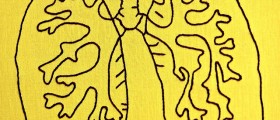
A cough is a defensive mechanism (a reflex) which helps the body to clear the airways from secretions, irritants, microorganisms and foreign particles. The very reflex comprises of three phases - inhalation, forced expelling of the air (exhalation) that pushes the air through a closed glottis and finally, the third phase is a violent release of air from the lungs once the glottis is opened. This explains the sound effects of the cough. Coughing can be voluntary and involuntary and it can be dry or one coughs up sputum or phlegm.
What Causes Cough with Phlegm?
Since phlegm represents the response of the lung tissue to infection cough with phlegm generally affects people suffering from upper or lower respiratory tract infections.
Frequent coughing is generally a sign of an illness. In many cases coughing develops as a consequence of bacterial or viral infection of both upper and lower respiratory tract diseases (cold, sinusitis, pharyngitis, pneumonia etc.). Furthermore, it can result from exposure to environmental pollutants, irritants or occur due to post-nasal drip or gastroesophageal reflux disease.
Smokers are more prone to cough in general. Furthermore, cough with phlegm is common for patients suffering from more serious illnesses such as chronic bronchitis, asthma, heart failure. In some cases the reflex occurs as a side effect of certain medications. For example, ACE inhibitors, medications commonly used in patients suffering from hypertension and congestive heart failure, are able to cause cough in some people. And finally, the problem also affects people suffering from lung cancer.
Cough with Phlegm - Treatment
Treatment for cough with phlegm generally depends on the underlying cause of the condition responsible for the onset of the cough. Apart from being prescribed with certain medications patients are supposed to follow doctor's orders and stick to certain recommendation. For example, it is recommendable not to swallow phlegm but to expel it with cough as often as possible. By drinking plenty of water phlegm will lose its thickness and will be easily removed. Nasal decongestants and sprays fight against blockage of nasal passages that commonly affects people suffering from sinusitis, cold or flu. This way secretions can be easily removed and they will drain down the throat and cause irritation of lower parts of the respiratory tract less. Cough expectorants are prescribed to patients who have difficulty coughing up mucus. It is essential to avoid cough suppressants. These drugs are only prescribed in case of dry cough and never in case of a chesty and productive cough. And finally, smokers should quit smoking at least until they properly heal from the infection and stop coughing.











-And-Breathing-Problems_f_280x120.jpg)



Your thoughts on this
Loading...